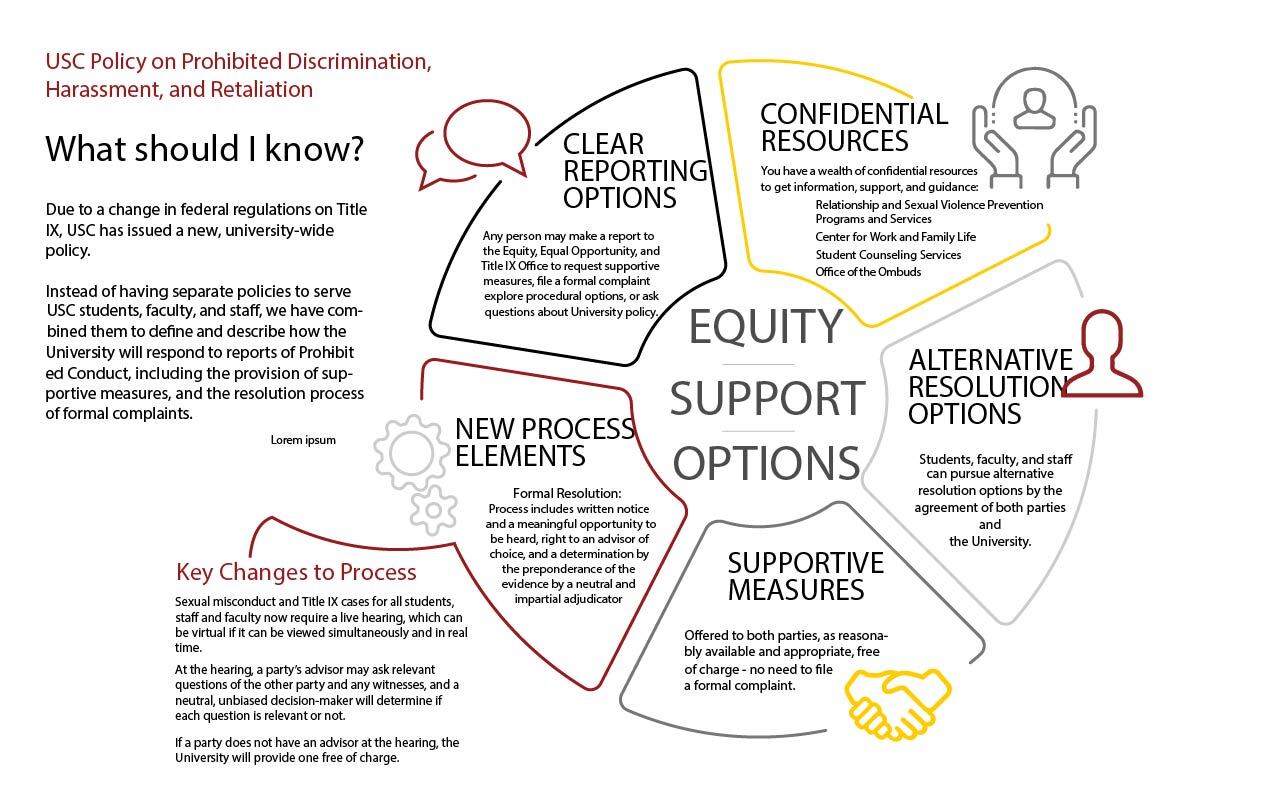Policy on Prohibited Discrimination, Harassment, and Retaliation
The University’s Policy on Prohibited Discrimination, Harassment, and Retaliation, which was updated effective January 1, 2022, is linked below and on the USC Policy site, along with the University’s Notice of Non-Discrimination and other related policies. For ease of navigation, you may click on the Table of Contents to access any portion of a report that interests you. Please contact our office if you need an earlier version of a policy or resolution process at eeotix@usc.edu.
Archive Versions
- Resolution Process for Sexual Misconduct (Effective 8-14-20 to 12-31-21)

What Should I Know?
In summer 2020, USC first issued a new, University-wide policy. Instead of having separate policies to serve USC students, faculty and staff, we combined them into a single Policy to define and describe how the University will respond to reports of Prohibited Conduct, including the provision of supportive measures, and the resolution process of Formal Complaints.
Confidential Resources
You have a wealth of confidential resources to get information, support, and guidance, including but not limited to the following:
Report and Response website
Relationship and Sexual Violence Prevention Programs and Services
Alternative Resolution Options
Students, faculty, and staff can pursue Alternate Resolution options by the agreement of both parties and the University.
Supportive Measures
Offered to both parties, as reasonably available and appropriate, free of charge – there is no requirement to file a Formal Complaint.
New Process Elements
Formal Resolution: Process includes written notice and a meaningful opportunity to be heard, right to an advisor of choice, and a determination by the preponderance of the evidence by a neutral and impartial decision-maker (i.e., Hearing Officer).
Key August 2020 Changes to Resolution Process
Sexual misconduct and Title IX cases for all students, staff, and faculty require a live hearing, which currently are held virtually in a manner to permit simultaneously, real-time viewing of the hearing by the parties. At the hearing, a party’s advisor may ask relevant questions of the other party and any any witnesses for Title IX Sexual Harassment issues. A neutral, unbiased Hearing Officer will determine if each question is relevant or not. If a party does not have an advisor at the hearing, the University will provide one free of charge.
Clear Reporting Options
Any person may make a report to the Equity, Equal Opportunity, and Title IX Office to request supportive measures, file a formal complaint, explore procedural options, or ask questions about the Policy.
Feedback
In August 2020, USC first released the University-wide Policy on Prohibited Discrimination, Harassment, and Retaliation to address all forms of discrimination and harassment on the basis of protected characteristics, retaliation, and sexual harassment, sexual assault, dating violence, domestic violence, and stalking. The Policy was updated to comply with new California state requirements effective January 1, 2022. We will continue to review and monitor the implementation of this new Policy and welcome feedback from our community.